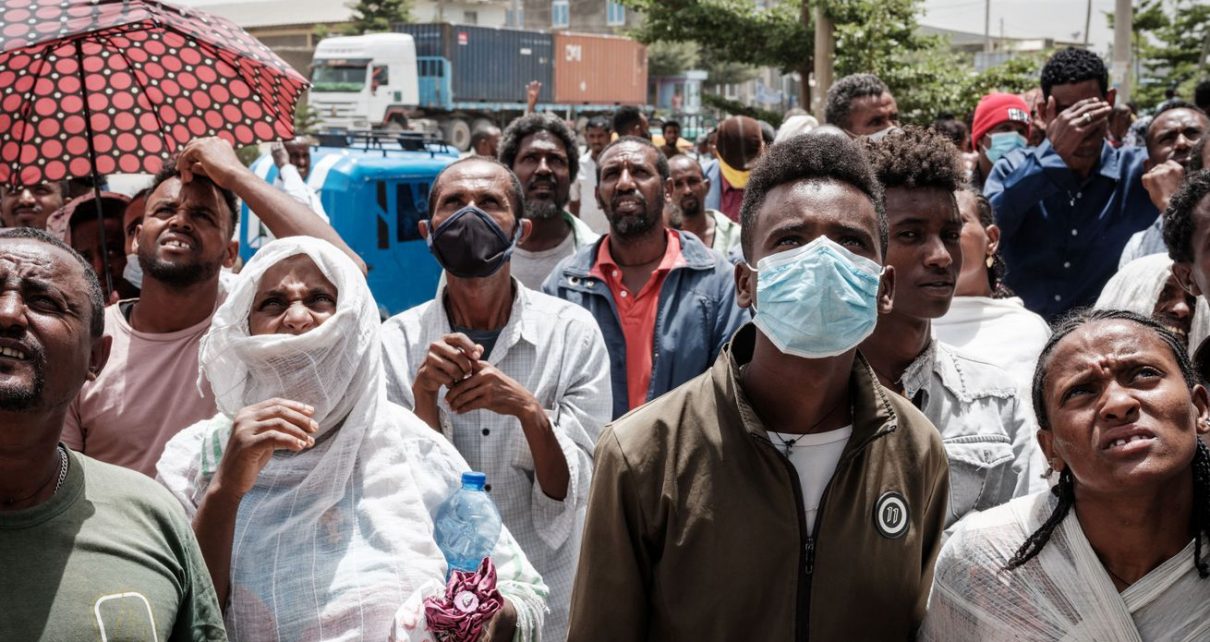
Ethiopia’s federal government has blocked humanitarian aid for the embattled Tigray region.
The Ethiopian government moved to expel seven United Nations officials from the country on Thursday, in a dramatic move that threatens to exacerbate the region’s ongoing humanitarian crisis.
A civil war between Ethiopia’s federal government and the country’s northern Tigray region, which began late last year, has led to widespread atrocities and created famine conditions in parts of the country. Prime Minister Abiy Ahmed’s decision to expel UN officials from the country comes after they raised concerns about the worsening humanitarian situation.
UN officials have repeatedly warned that Ethiopia’s government is blocking the movement of critical supplies — like medicine, food, and fuel — into the Tigray region, with as little as 10 percent of the needed humanitarian supplies being allowed in. Those accusations were echoed this week by the head of the UN’s humanitarian aid arm, as well as a report finding the region on the brink of famine.
Abiy’s Thursday announcement, which gave the officials just 72 hours to leave the country, is a rare departure from international norms. While it’s not completely unprecedented for a nation to kick UN officials out, it is unusual — and according to the New York Times, Abiy’s decision would be among the largest such expulsions of UN officials in history, outpacing Syria’s removal of three UN officials in 2015.
As of Saturday, however, it’s unclear whether the seven officials have left the country — and UN Secretary-General Antonio Guterres has already pushed back on the move, saying in a statement Friday that the UN is “now engaging with the Government of Ethiopia in the expectation that the concerned UN staff will be allowed to continue their important work.”
US officials have also condemned Abiy’s push to expel UN officials.
“The expulsion is counterproductive to international efforts to keep civilians safe, and deliver lifesaving humanitarian assistance to the millions in dire need,” Secretary of State Antony Blinken said in a Thursday statement.
At a time of looming, heartbreaking famine, the government in #Ethiopia shockingly just expelled a @UNICEF officer & 6 other @UN personnel. Millions of people face desperate need in northern Ethiopia, and the government keeps taking steps to ensure aid won’t reach them. https://t.co/C84pWfr5Dy
— Samantha Power (@PowerUSAID) September 30, 2021
Abiy’s government has justified the expulsion order by accusing UN officials of “meddling” in Ethiopia’s affairs, but it comes just two days after the head of the UN’s Organization for the Coordination of Humanitarian Affairs, or OCHA, raised concerns about famine in Tigray, home to about 6 million people. The official directive from the Ethiopian Ministry of Foreign Affairs came Thursday, the same day the OCHA released a report finding that 79 percent of pregnant or breastfeeding women in Tigray are malnourished, and that fuel and medicine haven’t reached the region since July.
According to the UN, 5.2 million people in Tigray — about 90 percent of its population — are in need of humanitarian assistance in order to survive, necessitating a flow of about 100 supply-laden trucks into the region per day. Yet only 606 such vehicles have made it into the state since July 12, the New York Times reports.
This is not the first time the government has forced a humanitarian group out of Tigray for opposing the official government narrative on conditions there.
The Dutch arm of Médecins Sans Frontières — MSF, or Doctors Without Borders — suspended its activities in west and northwest Tigray for three months starting in early September after the Ethiopian Agency for Civil Society Organizations directed them to do so in late July. The Norwegian Refugee Council was issued the same order July 30 and suspended its Ethiopia operations in early August; Ethiopian authorities had accused the groups of backing the Tigrayan political cause, even claiming that aid workers armed members of the Tigrayan People’s Liberation Front, or TPLF.
Ethiopia ended one war and started another
The dismissal of the UN officials is the latest development in the Ethiopian government’s ongoing war in the Tigray region. For the past 11 months, since Abiy sent in the Ethiopian National Defense Forces, or ENDF, into Tigray to retaliate against a TPLF attack on a ENDF base there, Tigray has slid further toward disaster.
That initial skirmish, as Vox’s Jen Kirby explained in April, was widely seen as a pretext for the national government to invade the Tigray region.
Conflict between the Tigray, which is an ethnic group as well as a region of the country, and the Abiy administration seemed inevitable almost since Abiy took power in 2018. Abiy’s rise to power ended nearly 30 years of domination by the Tigrayan wing of the Ethiopian People’s Revolutionary Democratic Front, or EPRDF.
Prior to Abiy, protests against government corruption and human rights abuses were mounting in Ethiopia; in particular, Kirby says, the Omoro and Amhara ethnic groups were frustrated by the Tigray grip on positions of power in the government and military, even though only 6 percent of Ethiopians are Tigray.
In 2018, Abiy — a member of the Omoro group and a relative political newcomer — was elected head of the EPRDF and assumed the role of prime minister. He came into the power promising democratic elections and the freeing of political prisoners, and even brokered peace with neighboring Eritrea, ending a 20-year war. The following year, he was awarded the Nobel Peace Prize for ending that conflict — only to precipitate a brutal civil war a year later.
“This is man-made, this can be remedied by the act of government”
Now, as Ethiopia’s civil war approaches the one-year mark, international aid groups say the Tigray state’s deadly famine is poised to get worse.
“We predicted that there were 400,000 people in famine-like conditions, at risk of famine, and the supposition was that if no aid got to them adequately they would slip into famine,” Martin Griffiths, the OCHA head, told Reuters this week, citing a June UN assessment. Since June, Abiy’s administration has imposed what Griffiths called a “de-facto blockade,” with only about 10 percent of the urgently needed supplies getting into Tigray.
The crisis has been made even worse by another factor: In addition to civil war, a plague of desert locusts disrupted the region’s growing season over the last two years, with Ethiopia and neighboring Somalia and Kenya bearing the brunt of the invasion of the crop-eating pests. A 2019 report from the Food and Agriculture Organization of the UN specifically points to Ethiopia’s Tigray, Somali, Orowia, and Amhara states as suffering the worst of the swarm’s damage.
But despite the swarms of locusts and consecutive seasons of low rainfall and crop yield, the UN says the primary driver of Tigray’s looming famine is still Ethiopia’s federal government.
“This is man-made, this can be remedied by the act of government,” Griffiths said.
It’s unclear, however, whether there is any end in sight to the conflict. The war in Tigray has already spilled over into neighboring states in Ethiopia and displaced more than 1.7 million people from their homes; as the conflict wears on, those problems only stand to worsen.
The UN Security Council discussed the situation in a Friday meeting, with some member nations expressing grave concerns over Ethiopia’s behavior, both present and future.
“As a major new military offensive looms, this seems like Ethiopia’s attempt to test if the international community is prepared to respond with more than words to an unfolding famine,” an unnamed Western official told Reuters.
“We’re worried it may be a precursor to other activity,” Geraldine Byrne Nason, Ireland’s ambassador to the UN, said Friday.





